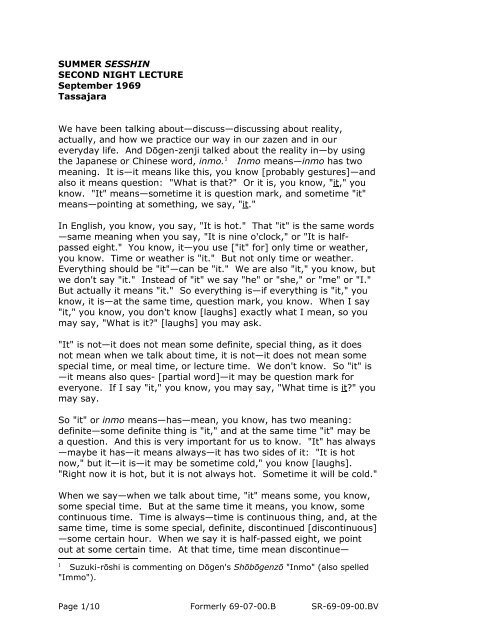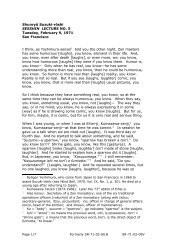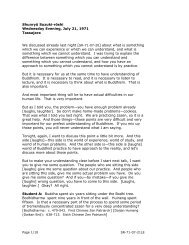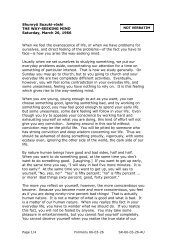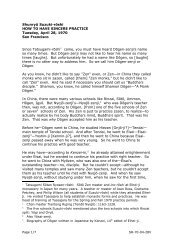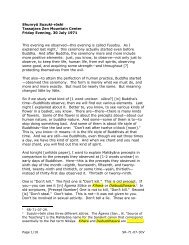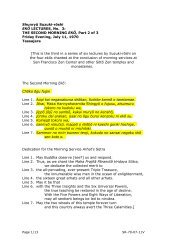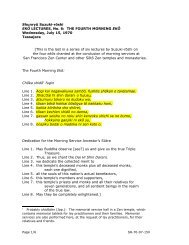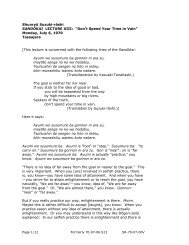SUMMER SESSHIN SECOND NIGHT LECTURE ... - Shunryu Suzuki
SUMMER SESSHIN SECOND NIGHT LECTURE ... - Shunryu Suzuki
SUMMER SESSHIN SECOND NIGHT LECTURE ... - Shunryu Suzuki
You also want an ePaper? Increase the reach of your titles
YUMPU automatically turns print PDFs into web optimized ePapers that Google loves.
<strong>SUMMER</strong> <strong>SESSHIN</strong><br />
<strong>SECOND</strong> <strong>NIGHT</strong> <strong>LECTURE</strong><br />
September 1969<br />
Tassajara<br />
We have been talking about—discuss—discussing about reality,<br />
actually, and how we practice our way in our zazen and in our<br />
everyday life. And Dōgen-zenji talked about the reality in—by using<br />
the Japanese or Chinese word, inmo. 1 Inmo means—inmo has two<br />
meaning. It is—it means like this, you know [probably gestures]—and<br />
also it means question: "What is that?" Or it is, you know, "it," you<br />
know. "It" means—sometime it is question mark, and sometime "it"<br />
means—pointing at something, we say, "it."<br />
In English, you know, you say, "It is hot." That "it" is the same words<br />
—same meaning when you say, "It is nine o'clock," or "It is halfpassed<br />
eight." You know, it—you use ["it" for] only time or weather,<br />
you know. Time or weather is "it." But not only time or weather.<br />
Everything should be "it"—can be "it." We are also "it," you know, but<br />
we don't say "it." Instead of "it" we say "he" or "she," or "me" or "I."<br />
But actually it means "it." So everything is—if everything is "it," you<br />
know, it is—at the same time, question mark, you know. When I say<br />
"it," you know, you don't know [laughs] exactly what I mean, so you<br />
may say, "What is it?" [laughs] you may ask.<br />
"It" is not—it does not mean some definite, special thing, as it does<br />
not mean when we talk about time, it is not—it does not mean some<br />
special time, or meal time, or lecture time. We don't know. So "it" is<br />
—it means also ques- [partial word]—it may be question mark for<br />
everyone. If I say "it," you know, you may say, "What time is it?" you<br />
may say.<br />
So "it" or inmo means—has—mean, you know, has two meaning:<br />
definite—some definite thing is "it," and at the same time "it" may be<br />
a question. And this is very important for us to know. "It" has always<br />
—maybe it has—it means always—it has two sides of it: "It is hot<br />
now," but it—it is—it may be sometime cold," you know [laughs].<br />
"Right now it is hot, but it is not always hot. Sometime it will be cold."<br />
When we say—when we talk about time, "it" means some, you know,<br />
some special time. But at the same time it means, you know, some<br />
continuous time. Time is always—time is continuous thing, and, at the<br />
same time, time is some special, definite, discontinued [discontinuous]<br />
—some certain hour. When we say it is half-passed eight, we point<br />
out at some certain time. At that time, time mean discontinue—<br />
1<br />
<strong>Suzuki</strong>-rōshi is commenting on Dōgen's Shōbōgenzō "Inmo" (also spelled<br />
"Immo").<br />
Page 1/10 Formerly 69-07-00.B SR-69-09-00.BV
discontinuity. And—but time, by nature, it is something continued—<br />
continuous thing, so one words has two side: continuity and<br />
discontinuity. That is the nature of reality to us.<br />
So we have been talking about things for tonight in term of<br />
discontinued—some special discontinuous, specialized being which has<br />
form or color, you know. That is inmo. That was inmo.<br />
But Dōgen-zenji again talked—talks about our practice in term of<br />
something continuous, not special—something which is mixed up<br />
[laughs] with everything. If we are not ready to discuss things, we will<br />
not have a complete understanding of our teaching. As he says:<br />
"Those who," you know, "fell on the ground should stand up by the<br />
ground—by the earth." 2 I don't know if it makes some sense to you.<br />
What do you say? "To fell on the ground"—"to fell," or—?<br />
Student: Fall.<br />
Another student: Fall on the ground.<br />
<strong>Suzuki</strong>-rōshi: Hmm?<br />
Student: Fall on the ground?<br />
<strong>Suzuki</strong>-rōshi: Mm-hmm. Yeah. Like this [probably gestures]. Fall<br />
on the ground? Should stand up by the earth—by the ground at that<br />
place. And he also says, "If you fall on the ground," you know, "you<br />
should," you know, "stand up"—what should I say? It is rather difficult<br />
—"by emptiness [laughs], by nothing." Actually we—actually we stand<br />
up by the ground like this [probably gestures], you know, but he says<br />
we shouldn't stand up by the ground. What does it—it means is if you<br />
think, you know, you can stand up by the ground always, it would be a<br />
big mistake. If you rely on, you know, ground, if you rely on the<br />
ground—on ground and don't mind to fall on the ground, you know,<br />
you will fall on the ground quite easily. "It's all right. I can stand up<br />
by the ground." [Laughs.] So he said you shouldn't—you shouldn't<br />
think you can stand up on the ground—by the ground.<br />
And this point is important, you know. It is like enlightenment. If you<br />
rely on enlightenment, you know, and practice zazen, it is someone<br />
who easy—who easily, you know, make mistake or fall on the ground,<br />
relying on the help of the ground. Do you understand? It is rather—<br />
do you understand? There is very subtle point. To stand up by the<br />
ground—of course we have to stand up by the ground at the time, but<br />
if you stick to the idea of help of the ground all the time, you know,<br />
2<br />
Quoting Dōgen in Shōbōgenzō "Inmo," who in turn quoted the fourth<br />
Indian patriarch Upagupta in Keitoku Dentōroku (Keitoku Era Record of the<br />
Transmission of the Light), Chapter 1.<br />
Page 2/10 Formerly 69-07-00.B SR-69-09-00.BV
you lose the true meaning of fall on the ground. In other word, we<br />
should not make same mistake [laughs] many many times. Even<br />
though you make mistake—you may think, you know, even though<br />
you make some mistake, it is all right. We know how to get up.<br />
That is not what we mean when we say "reality." Things happen—<br />
things does not happen many times in the same way. Even it doesn't<br />
happen same way twice. But if we say, if you fell—fall on the ground,<br />
you should stand up by the ground, then you—you will have this kind<br />
of idea: "Okay, I know how to stand up, so it's all right, even though I<br />
fall on the ground by mistake." With this kind of prejudice or easy<br />
idea, if we practice our way that is wrong practice.<br />
You recite each time in lecture, you know, "Even one hundred kalpas<br />
of time, you cannot meet with the teaching." That is the true, you<br />
know. Truth is—exist—truth is true only when you listen to, you know.<br />
And when you try to repeat what someone said, that is not truth<br />
anymore. When he said so, it is true. When someone said so, it is<br />
true because the ground is already—has two meaning. It is, you<br />
know, at that time ground, but ground can be—can be a stick<br />
sometime, can be a stone sometime, can be a water sometime.<br />
Ground is "it," you know. "It" means everything, not just ground. It<br />
means that you should renew your way of practice. Each time you<br />
practice, you have—must have fresh new feeling. With fresh and new<br />
feeling, you should practice our way. Try not to have same<br />
experience, you know. Your experience of practice should be always<br />
new, and should be always "it." It should not be some definite<br />
particular experience.<br />
So there is nothing to rely on in our practice. But on the other hand,<br />
there is always something provided for you, always. According to the<br />
circumstances, you will have some aid to practice our way. You know,<br />
even pain in your legs is help, you know. By the pain you have, you<br />
should practice our way. The pain is "it." It is, at that time, some<br />
definite experience or definite trouble or thing. But "it" can be<br />
drowsiness [laughs]; "it" can be hunger; "it" can be hot weather. So<br />
hot weather or cool weather—nice and cool weather, or hunger, or<br />
mosquito [laughs], or pain in your legs can be a h- [partial word]—aid<br />
of your practice by which you can stand up—establish your practice.<br />
Not only, you know, Buddha's teaching, but also everything can be aid<br />
of practice. So we say inmo. Inmo-ji. Inmo-ji means "things." 3 And<br />
3<br />
<strong>Suzuki</strong>-rōshi defined ji in a later Sandōkai lecture: "Ji refers to the<br />
phenomenal—to something you can see, hear, smell, or taste as well as to<br />
objects of thought or ideas. Whatever can be introduced into our<br />
consciousness is ji" (Branching Streams Flow in the Darkness, p. 53; also SR-<br />
70-06-01, p. 3).<br />
Page 3/10 Formerly 69-07-00.B SR-69-09-00.BV
those who practice zazen is also inmo-nin. -Nin means "person."<br />
-Nin in Japanese means "person." Inmo-nin—"someone—someone<br />
practicing something." That is reality. [Laughs.] Even though you<br />
are practicing actually, right here, but in its true sense you should<br />
understand "someone practicing something." Or "someone doing<br />
something." Not only practice. "Someone doing something."<br />
So if—if it—it is so, "doing" is not necessary, you know. "Someone"<br />
and "doing" and "someone" and "doing" and "something" is same<br />
thing, you know. Doing—someone which will practice zazen, include<br />
everything. He cannot be separated from this world. And some action<br />
cannot exist without background of whole world. Something cannot be<br />
special thing from this world, so "something, something, something."<br />
[Laughs, laughter.] Then, what is that? That is complete realization.<br />
So one thing, you know—everything happens in that way. So if you<br />
understand—stick to the idea of help or experience or enlightenment,<br />
that is already mistake.<br />
As I am Sōtō [laughs]—Sōtō—I belong to Sōtō, if I say so: "Oh, he,"<br />
you know, "deny enlightenment experience." [Laughs.] It is not so.<br />
We Sōtō student do not stick to one thing. We don't stick to anything.<br />
We should have always freedom. In Japanese we say shusshin—<br />
shusshin-no-katsuro: 4 complete freedom. Complete freedom of<br />
practice, complete freedom of expression. Our practice is expression—<br />
a vivid expression of our true nature or reality.<br />
So for us it is not possible to stick to anything. So one after another,<br />
we have to practice our way in a quite renewed area and quite<br />
refreshed way. And our practice should be independent from past<br />
practice and future practice. We cannot sacrifice our practice for<br />
future attainment, because all the buddha who passed—attained<br />
enlightenment in this way, and all the buddha in future will attain<br />
enlightenment in this way. "In this way" means, you know [laughs]<br />
—"this," means "not any"—I do not, you know, mean Sōtō way or<br />
Rinzai way. Sometime Sōtō way. Sometime Rinzai way. Sometime<br />
some other school's way, according to the circumstances. The way we<br />
—how we attain enlightenment will be different. Someone will attain<br />
enlightenment when he see some flower or hear some sound like<br />
bamboo. Or someone may attain enlightenment when they take hot<br />
bath [laughs, laughter] there.<br />
And there were many kinds of people in Buddha's sangha. There was<br />
a twelve, you know, disciples who came from a rich family. And<br />
Bhadrapala Bodhisattva, 5 who attained enlightenment in a hot bath, is<br />
4<br />
shusshin-no-katsuro (Jap.): Literally, "the absolute way beyond<br />
enlightenment itself."<br />
5<br />
<strong>Suzuki</strong>-rōshi is referring to Bhadrapala's reply to Shākyamuni Buddha's<br />
question in the Shūrangama Sūtra. Shākyamuni: "Through which expedient<br />
Page 4/10 Formerly 69-07-00.B SR-69-09-00.BV
[laughs] one of the boy who came from very rich family. And rich and<br />
poor may attain enlightenment in various way: in hot bath, in rest<br />
room [laughs]. There is no Sōtō way or Rinzai way, actually. So we<br />
say "it." And "it"—that "it" means—and that "it" ha- [partial word]—<br />
means two—two side. "It" has two side: positive side and negative<br />
side.<br />
In short, what do we mean? You know, we—you know, we discuss<br />
very abstract way so that discussion include various way of practice.<br />
But in short, what it means is: whatever it is, we should accept. And<br />
by means of various things, we should practice our way. And there is<br />
no other way to attain enlightenment.<br />
Do you have some question? It may be rather difficult to make<br />
question, you know [laughing], because, you know, it is like to catch<br />
fish by net, you know. We talk something, you know, in this way so<br />
that you cannot escape from it. It is lucky to catch a fish by net. After<br />
throwing net, you know: "Is there some question?" is—doesn't mean<br />
much, but, you know, you escaped from the net. Okay.<br />
Student A: When I fall down on the ground, who is it that makes<br />
effort to get up?<br />
<strong>Suzuki</strong>-rōshi: You. Or Buddha.<br />
Student A: I have a problem—or it feels like it. Whenever I make<br />
effort, it—it seems to come from some sense of "I," maybe some pride<br />
or some very strong sense of self. Could you tell us about effortless<br />
effort?<br />
<strong>Suzuki</strong>-rōshi: Effortless effort. Effortless effort means the effort,<br />
knowing that there is no "I" or no ground, you know, and then<br />
something which is going with everything is effortless effort. The<br />
effort you make is not your effort, because there is no "you," you<br />
know. What is that effort? That effort is—the effort comes out from—<br />
from your mother body of whole being.<br />
You, you know—that you stand up means that everyone stand up, and<br />
everyone feel very good when you stand up. And when you st-<br />
[partial word]—when you attain enlightenment, everyone attains<br />
enlightenment with you. So if the practice does not include everyone<br />
did you enter samādhi?" Bhadrapala: "Once, when it was time for the<br />
Sangha to bathe, I followed the custom and entered the bathhouse.<br />
Suddenly I awakened to the fact that water does not wash away the dust, nor<br />
does it cleanse the body. And in that moment I became peaceful and<br />
attained the state of there being nothing at all… . The Buddha asks about<br />
perfect penetration. As I have been certified to it, touch is the foremost<br />
means" (Vol. 5, Part 1, Buddhist Text Translation Society).<br />
Page 5/10 Formerly 69-07-00.B SR-69-09-00.BV
of us, it is not true practice, we say. It is tainted practice by the idea<br />
of self. And you may have this kind of doubt or—after you do, after<br />
you do something as—like you—whether this is, you know, selfish, you<br />
know, things or not: "Why did I do this?" I think you will have this<br />
kind of—some uncertain feeling about what you do or what you did. I<br />
suffered from it [laughs] pretty much.<br />
Especially when you do something good, you know—supposed to be<br />
good, you suffer more [laughs]. When you did some—something by<br />
mistake, you don't suffer, you know. "This is by mistake, so I will not<br />
make same mistake again." That's all, you know. But if you try to do<br />
something good, after—or you did something which is supposed to be<br />
good, because you did something with some idea of good and bad, you<br />
suffer more. Especially by the idea of good, you suffer more [laughs]<br />
—you should suffer more [laughs]. That is good experience. Okay.<br />
Student B: Rōshi, I'm walking along, and everything's intact<br />
[laughter], and then I—<br />
<strong>Suzuki</strong>-rōshi: Walking?<br />
Student B: I'm walking along, and everything seems to be okay, and<br />
then thud!—I'm on the ground. I look around, and there's a small<br />
rock. So with a roar, I can pick up the rock and throw it off into the<br />
woods. But what if the rock is so big I can't lift it? So what am I<br />
going to do?<br />
<strong>Suzuki</strong>-rōshi: [Laughing.] Rock is so big?<br />
Student B: Yeah. It's stuck in the ground and I can't pick it up.<br />
<strong>Suzuki</strong>-rōshi: Yeah. You—no need to take it out. [Laughs,<br />
laughter.]<br />
Student B: But I feel some need to take it out—some strong need.<br />
[Loud laughter.]<br />
<strong>Suzuki</strong>-rōshi: That's deep ego [laughing]—too big. Your ego is too<br />
big. I thought if the rock is a great big one, it is more beneficial to,<br />
you know, stand up by it, you know. Small rocks will not help you so<br />
much, but if it is too—so big, it is easy to, you know, stand up by it. If<br />
you stand up, you know, you should work [walk?] off the rock. And<br />
there is no need to take—take it away.<br />
Actually, you know, problem—your problem is when you feel guilty,<br />
you know—when you feel guilty is the point. After you did something,<br />
you feel, you know, selfish. But before you feel selfish, you didn't feel,<br />
you know, anything. But after—after you did something, you start to<br />
Page 6/10 Formerly 69-07-00.B SR-69-09-00.BV
feel bad. So when you did it, it was all right. But after you did it, and<br />
when you think about it, the way you think about it was not—is not<br />
right. Do you understand? When you did it, you were not selfish. But<br />
when you think about it, you became already selfish. You expect<br />
something to be good. So don't think too much about what you did.<br />
Okay? If you think too much about what you did, it is—most of the<br />
time, it is, maybe, conscientious thing, but it is sometime very selfish<br />
idea is involved in it. So one after another, you should continue your<br />
practice, you know, without thinking, without being involved in so<br />
much selfish idea or dualistic idea. Okay? [Sentence finished. Tape<br />
turned over.]<br />
When I w- [partial word]—I had—I suffered a lot about it when I was<br />
at school, you know. And I was staying at dormitory, you know. And<br />
restroom was always dirty [laughs]—dormitory restroom was always<br />
dirty. So I, you know, made up my mind to clean it, you know. But I<br />
didn't want to clean it when people, you know, see [laughing]. So I<br />
get up early in the morning before they get up so that no one can find<br />
out me in cleaning, you know, restroom.<br />
It was pretty good, you know, for several days, but even though early<br />
in the morning someone get up [laughs]. I have very difficult time to<br />
hide myself [laughs, laughter] while doing this kind of thing, you<br />
know. Sometime, you know, our dean of the—head of the college or<br />
university—whatever it is—Nukariya 6 —Nukariya is his name—and he<br />
was very strict person. And he stayed in our dormitory with student<br />
[laughs]. And Saturday night was the night when he go home. He<br />
was so strict, in summertime when all the students went home, he<br />
would stay at dormitory, taking care of things. So most people who<br />
visited the dormitory to see—to see him, thought he was a garbage<br />
man [laughs] on the dormitory. He was so, you know—he was pretty<br />
good.<br />
And sometime, you know, I saw a light in his room, you know. I was<br />
very much scared of [laughing] him getting—coming to the restroom.<br />
So as soon as I saw the light in the dormitory, not only his room but<br />
also some room, I escaped from the restroom, and I was quite, you<br />
know, upset or, you know—I don't know what to say, you know. I was<br />
very much mixed up. At first, I—I felt very good, you know. And<br />
more and more, I had many things to think about. And I have too<br />
much to think about. So finally I—I have to think whether I should<br />
continue it or give up.<br />
6<br />
Kaiten Nukariya: president of Komazawa University, Tōkyō. He was<br />
<strong>Suzuki</strong>-rōshi's academic and thesis advisor at Komazawa. Nukariya's<br />
controversial book on Buddhism for laypeople, Shoshin Mondō (Questions and<br />
Answers about True Faith), was released in 1926, the same year that <strong>Suzuki</strong>rōshi<br />
came to Komazawa. While abroad, Nukariya wrote the first popular<br />
book on Zen in English, The Religion of the Samurai (1913).<br />
Page 7/10 Formerly 69-07-00.B SR-69-09-00.BV
But my nature—I was pretty stubborn, you know. I didn't like to give<br />
up something so easily. So I wanted to continue it, but I—I didn't<br />
want to have that kind of silly problems. But anyway I continued it.<br />
And I had—I studied psychology, you know. And he—the professor,<br />
you know, talked about our psychology, you know.<br />
And he said it is not possible to have same experience again, you<br />
know. Even though you think you did this kind of thing, but what you<br />
think about it and what you have experienced is not same—different,<br />
quite different. So actually you cannot have same experience again, in<br />
its strict sense. So it is not possible to, you know, to have same<br />
feeling again or same experience again. So I was enlight [?], you<br />
know. "Okay! It is not possible to think about it, so forget about it,<br />
and I will try—I will continue to do it. Whatever happen, it's—it is all<br />
right. And whatever they may say, that is all right." I continued my<br />
practice in that way, for I don't know how long.<br />
So don't think too much about it, you know. What you do is not<br />
selfish, but what you think—that you think about it is maybe selfish.<br />
So if you can forget all about it, you are not so selfish. Hai.<br />
Student C [Bill Shurtleff]: I think I understand what you mean<br />
when you say that what we do is not selfish, in the way that it affects<br />
other people.<br />
<strong>Suzuki</strong>-rōshi: Uh-huh.<br />
Bill: But it seems like there are some problems which cause us pain<br />
directly, and we think about them because they cause us pain directly,<br />
for example, during eating. And I have a problem that keeps<br />
happening again and again. And I think about it very often—each time<br />
that it happens, and I can see it happening even before it happens.<br />
And it still happens. And it's a problem with eating—like things—there<br />
are certain things that if I eat them, I know they will cause me<br />
suffering.<br />
<strong>Suzuki</strong>-rōshi: Mm-hmm. Yeah. [Laughs.]<br />
Bill: And every time that I eat them, I suffer. I get sick. There is an<br />
"I" afterwards who says: "You should never, ever eat that again<br />
[laughter] because every time that you've eaten it you've suffered and<br />
gotten sick." And yet, another "I" sees himself approaching that plate<br />
of food, and he can say eat it anyway [pervious six words are a guess<br />
—obscured by laughter]. And then afterwards, the other "I" comes<br />
along and says, "Now, you see!" Twenty times—the same thing<br />
happens every time. And every time I think about it, and think about<br />
it, and think about it.<br />
Page 8/10 Formerly 69-07-00.B SR-69-09-00.BV
<strong>Suzuki</strong>-rōshi: That is karma. [Laughs, laughter.] Yeah, we are—we<br />
have that kind of problem always. We know that this is not good. But<br />
—I don't know why, but, you know, something makes me doing<br />
something wrong. But, you know, some people may say that is a kind<br />
of destiny—fate, or, you know—it is not so. You can improve it little<br />
by little. We have no idea of, you know, fate or karma in—karma in<br />
that way.<br />
Bill: You emphasize accepting it, and my emphasis always seems to<br />
be on improving, and not doing it next time, rather than accepting it<br />
this time [student laughs].<br />
<strong>Suzuki</strong>-rōshi: Yeah. But before, you know, you try to improve<br />
yourself, you have to accept it, you know, or you have to see it clearly,<br />
you know. If you have idea of improvement first, you will miss the<br />
clear sight of the reality. So you have to see it first and try to improve<br />
it. Hai.<br />
Student D: I get the feeling, after sitting here for the last few days<br />
[1-2 words unclear]—a habit of sitting. And as I sit, I forget about it<br />
more. So it becomes a new habit. Maybe—maybe then that's sort of<br />
like an answer to Meg's 7 question and Bill's 8 question.<br />
<strong>Suzuki</strong>-rōshi: Yeah.<br />
Student D: It becomes a habit—a new habit. And you don't think<br />
about your habits.<br />
<strong>Suzuki</strong>-rōshi: Mm-hmm. Yeah. Habit. Yeah. That is—that is habit.<br />
But habit is very important, you know, in our practice. That is why,<br />
you know, we do same thing over and over again: to make some<br />
good habit. But difference between the habit, in usual sense, and our<br />
habit—good habit is we, you know, we are trying to make something a<br />
habit, you know. That something is, you know, the way to attain<br />
liberation. Usually habit is, you know, habit of smoking, habit of<br />
drinking [laughs]—something, you know—some habit directed to the<br />
other way.<br />
So our habit is to be free from things, we have this kind of practice.<br />
By practicing, we will have habit of being relieved from everything, to<br />
have more freedom from everything. This kind of habit is—the nature<br />
of habit is different. Do you understand? We, you know, bow to the<br />
Buddha. We observe ceremonies in the same way over and over<br />
again. But this habit will result complete freedom from—for you.<br />
Zazen practice will give you the power of being free from things. So<br />
7<br />
Possibly Meg Gawler.<br />
8<br />
Definitely Bill Shurtleff (confirmed by voice).<br />
Page 9/10 Formerly 69-07-00.B SR-69-09-00.BV
we—if I use "habit" in usual sense, we practice our way to destroy<br />
various, you know, habit in its bad sense. Okay?<br />
Student D: Sesshin seems to break some of my habits—thinking in<br />
the past of, say, my habit of overeating.<br />
<strong>Suzuki</strong>-rōshi: Mm-hmm.<br />
Student D: And sesshin comes and I just cut it off, and it's gone for<br />
seven days. And—but at the end, there's always—I—I guess the<br />
longer I practice, the more I will be faced with this choice between<br />
keeping the habit broken or over-reacting, you know. I think, "Well,<br />
seven days of not overeating! Wow!" [Laughs, laughter.] [2-3 words<br />
unclear.]<br />
<strong>Suzuki</strong>-rōshi: Yeah. Right. Yeah, that is very true. We say, "One<br />
hundred lecture [laughs] end in," you know, "one poo." [Laughing,<br />
laughter throughout rest of paragraph.] What do you call it? After<br />
giving you one hundred times of lecture, and you make big poo—big<br />
one, you know! That's worse—make me worse. If I haven't given—<br />
gave lect- [partial word]—given lectures, you know, to you it was all<br />
right. Because I gave lecture, you know, to—to make poo is very—<br />
makes me worse. That is not actually laughing matter [laughing].<br />
Okay.<br />
_______________________________________________________________________<br />
Source: City Center transcript entered onto disk by Jose Escobar, 1997.<br />
Transcript checked against tape and made verbatim by Bill Redican<br />
(11/15/00). Tenshin Reb Anderson graciously recalled, from memory,<br />
<strong>Suzuki</strong>-rōshi's citation of Bhadrapala.<br />
Page 10/10 Formerly 69-07-00.B SR-69-09-00.BV


